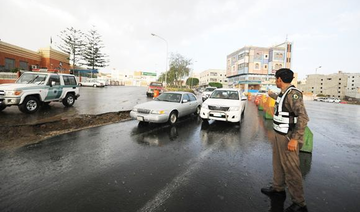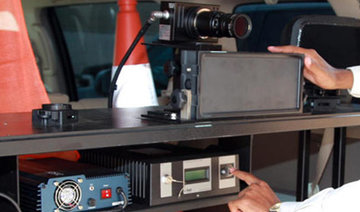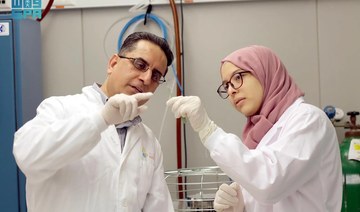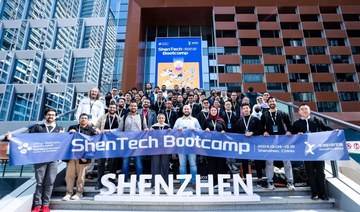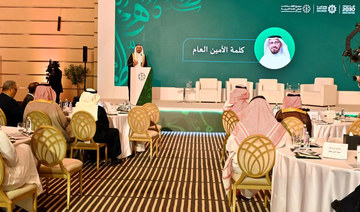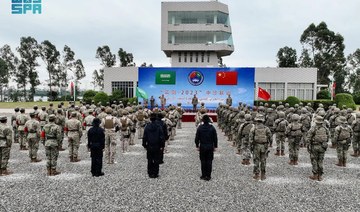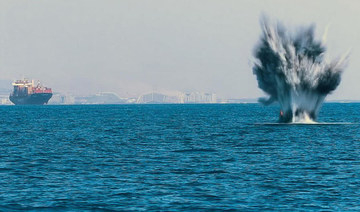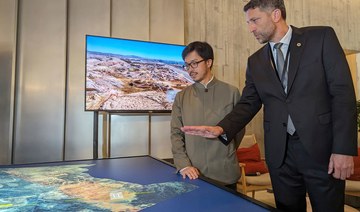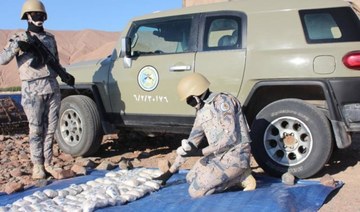JEDDAH: “I’m driving. I’ll call you later.” This will perhaps be the most common SMS message to spread from now on, as the Saudi General Department of Traffic (GDT) on Monday started imposing fines on unbuckled motorists or those who use cellphones while driving in three major cities.
The GDT had earlier announced that it would add a number of violations to its automated traffic-monitoring system (Saher). The system began spotting violators in Riyadh, Jeddah and Dammam on Monday. Violations will be recorded against vehicle owners or those officially authorized to drive them. It added that SMS messages would be sent to violators’ mobile numbers. The GDT has also called upon all motorists and passengers to comply with all rules tailored for the safety of road users.
The new violations include allowing children to sit in the front seat, not giving priority on the road and improper use of the horn. Drivers who commit one of these violations will be fined to an amount ranging from SR150 to SR300 ($40 to $80).
Over the past seven days, the GDT has clarified on its Twitter account that drivers will also be penalized for driving with a front-seat passenger not wearing a seatbelt. Audiovisual material shows that using seatbelts can reduce deaths and severe injuries in an accident by 50 percent.
The material also shows that using a cellphone while driving is responsible for 60 percent of traffic accidents in the country. However, the GDT made it clear that drivers can use any audio headset or external speakers to make calls while behind the wheel. The GDT excluded those using cellphones while their vehicles are static at traffic lights.
It denied a rumor that a tissue box on the dashboard of the vehicle would be considered as a violation.
The GDT asked drivers with objections or dissent to visit a traffic violation dispute committee at their nearest traffic department to make a complaint and receive the final word about a violation.
Hisham Al-Huwaish, a social media activist, told Arab News that the regulations have been made for our own safety and we have to remember that traffic rules are always there to protect us against danger.
“The only problem people will face is the addiction to using cellphones while driving, but this bad habit will disappear within days,” Al-Huwaish said.
As for the use of cellphones, Al-Huwaish, who is also a TV presenter, said if he was forced to drive without his seatbelt fastened, he would desist from driving. “Buckling up has become part of my life, and I cannot imagine driving without fastening my seatbelt. It has become a habit, and so will stop using my cellphone,” he added.
Al-Huwaish pointed out that he, as a celebrity, always sends awareness messages to his Twitter and Snapchat followers, reminding them about safety on the road.
Mohammed Al-Shareef, a schoolteacher, told Arab News that it is not too late to save our sons’ lives, and it will never be. “It is a decision that we have waited long for. The situation has worsened to the extent that you see many young people using cellphones chatting with friends while driving.”
GDT is working on listing invalid vehicle insurance as another violation to be recorded by the Saher system.
Car accidents in 2016 killed 9,031 people, 12 percent of the 70,000 deaths in the Kingdom in that year, with an average of more than 25 deaths a day and one death an hour. The rate of increase is the highest since 2007. The number of accidents in the same year increased by 2.8 percent compared with 2015 — from 518,000 to 533,000 — causing more than 38,000 injuries with an average of 4.5 an hour and 103 a day, according to an Aleqtisadiah newspaper report based on the data of the General Authority for Statistics and the Ministry of Municipal and Rural Affairs.
Between 2006 and 2016, 78,487 people died in car accidents, constituting 12 percent of deaths in the Kingdom in the same period.
Saudi Arabia clamps down on motorists who commit violations
Saudi Arabia clamps down on motorists who commit violations

KAUST program inspires young scientific talent
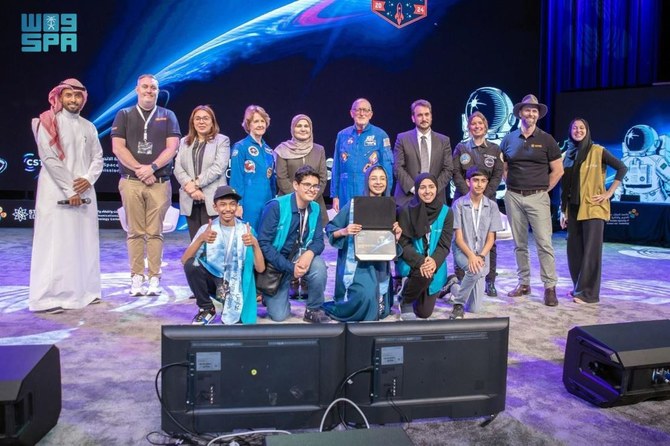
- Space 2102 program hosted 150 outstanding students, aged from 13 to 15, from various regions, in a five-day event
- Program included lectures, software training, and enrichment activities to guide and develop the students’ learning journey
RIYADH: King Abdullah University of Science and Technology is creating new opportunities for young people in Saudi Arabia by supporting research and innovation in science, technology, engineering, mathematics and space.
These efforts are part of the Space 2102 program, organized in partnership with the Communications, Space and Technology Commission and the Saudi Space Agency.
The program hosted 150 outstanding students, aged from 13 to 15, from various regions, in a five-day event, the Saudi Press Agency reported on Monday.
A team of international experts and KAUST faculty provided the students with training and education.
The Space 2102 program included lectures, software training, and enrichment activities to guide and develop the students’ learning journey.
Dr. Najah Ashry, vice president of the strategic national advancement division at KUAST, highlighted the success of the Space 2102 program, which aims to fulfill the dreams and aspirations of talented young Saudis in fields such as science, technology, and space.
KAUST’s early-onset enrichment activities help to engage the best young minds in the program, which improves the likelihood of science-based future leaders and entrepreneurs emerging and of a new era of leadership, research, and exploration in the Kingdom, the SPA reported.
The Space 2102 program concluded with a CubeSat challenge, where teams used technology to design and test their own missions. The focus was on using science and technology to address the conservation and rehabilitation of coral reefs in the Red Sea.
King Salman academy to host Arabic education forum in Seoul

- Scholars, teachers, linguistic experts will attend May 9 and 10
- Discussions on curricula, teaching methods and Arab culture
RIYADH: The King Salman Global Academy for Arabic Language is partnering with the Korean Association of Arabic Language and Literature and Hankuk University of Foreign Studies to host an international conference in Seoul, South Korea.
The conference, titled “Challenges and Prospects of Teaching Arabic Language and Literature,” is set for May 9 and 10, the Saudi Press Agency reported on Monday.
Participants will discuss key issues involving Arabic-language education globally and explore new approaches in response to evolving trends and needs.
The event will involve scholars, researchers and language experts; and will help promote Arab culture, the SPA reported.
The conference will focus six key areas related to teaching Arabic as a second language in Korea: modern methodologies, teaching materials, evaluation techniques, instructional strategies, and the current state of Arabic-language learning in Korea.
By bringing together experts and academics from Saudi Arabia, Korea and other regions, the conference is designed to assist Arabic-language teachers and non-native speakers.
The King Salman academy is also set to launch its upcoming international conference on computational linguistics.
Red Wave-7 naval drill kicks off in Saudi Arabia

RIYADH: The Red Wave-7 naval exercise has started at King Faisal Naval Base, home of the Western Fleet.
As well as the Royal Saudi Naval Forces, taking part are countries including Jordan, Egypt, Djibouti, and Yemen, along with the Royal Saudi Land Forces, the Royal Saudi Air Force, and units of the Saudi Border Guard.
The commander of the Western Fleet, Rear Admiral Mansour bin Saud Al-Juaid, said the drill aimed to enhance maritime security for countries bordering the Red Sea and protect territorial waters, according to Saudi Press Agency.
The drill includes a number of scenarios featuring exercises that offer significant training opportunities. There will be strategic lectures and simulated combat exercises designed to reflect potential real-world situations.
It will promote joint and combined operations, such as surface and air warfare, electronic warfare, and countering speedboat attacks. The forces will also conduct maritime security exercises, including protecting shipping lines and combating smuggling, terrorism, piracy and illegal immigration.
Al-Juaid said naval ships, helicopters, fast response boats, naval infantry, maritime special security forces and various types of combat aircraft would all be deployed over the duration of the drill.
Hareed Festival: A window into the heart of the Farasan Islands

- Annual event highlights tourism potential
Riyadh: The Farasan Islands, a string of coral islands nestled 40 km off the coast of Jazan in the Red Sea, have been abuzz with activity recently as they hosted the 20th Hareed Festival.
This vibrant annual event celebrates the arrival of parrotfish, also called hareed, in the islands’ shallow waters, the Saudi Press Agency reported on Sunday.
The islanders have cherished this event for generations, transforming it into a social gathering that goes well beyond the arrival of the fish.

Visitors to the festival got a glimpse of the islands’ rich cultural heritage as it showcased the area’s unique customs, traditions, folk games, and handicrafts. It also focused its spotlight on Farasan’s remarkable tourism potential and historic sites.
Al-Dana provides one of the highlights. It is a captivating form of vocal art that is one of Farasan’s oldest folk traditions. It forms a poignant expression of longing, a result of the hardships endured by sailors on extended pearl-diving expeditions. The challenges faced by these brave men fueled the art form, which is deeply rooted in Farasan’s cultural identity.
The annual festival also gives an opportunity for Farasan residents to display their traditional handicrafts. Visitors can watch the making of fishing traps and nets, the intricate weaving of palm fronds, the creation of bags and rugs, and hat knitting.
A designated area at the hareed fishing site catered to families and children. Visitors could experience the thrill of catching parrotfish using a traditional method that involved setting up barriers to prevent the fish from escaping. This competition, a centuries-old tradition, allowed families to connect with the region’s fishing heritage.

Farasan’s most renowned tourist attractions highlighted the islands’ potential for tourism.
Al-Qassar village, which is located only 5 km from Farasan Grand Island, is a popular tourist site. This heritage village, which is built of stone and palm leaves, is home to the archipelago’s largest palm oasis.
Al-Qassar has served as a summer retreat for Farasan residents. People travel by camel to spend a three-month break in the village during the season of Al-Asef, the northwestern summer wind that comes after the hareed fishing season.
Famous for its abundance of fresh groundwater, Al-Qassar village comprises around 400 houses. These unique dwellings, with stone walls and roofs made of palm tree planks, leaves, doum palm, or anisotes trisulcus branches, topped with algae and mud, are made by traditional building techniques designed to withstand the elements.
The Hareed Festival is a window into the heart and soul of the inhabitants of the Farasan Islands; a celebration of culture, tradition, and the islands’ natural beauty.
Saudi Border Guard arrest 4 attempting to smuggle qat

JAZAN: The Kingdom’s Border Guard in Al-Ardah, Jazan, recently arrested four Yemeni nationals attempting to smuggle 80 kg of qat into the country, the Saudi Press Agency reported on Monday.
Mostly chewed by users, Qat is a mild stimulant and illegal across most of the Arab world.
The government has urged citizens and residents to report any information they have regarding drug smuggling or sales to the General Directorate of Narcotics Control. Reports can be made by calling 911 for Makkah, Riyadh and the Eastern Province, and 999 for other regions. Alternatively, information can be emailed to [email protected]. All reports are treated confidentially.


